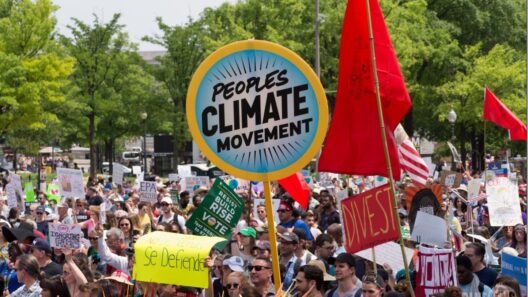The intricate interplay between politics and climate change is encapsulated by a peculiar alliance often referred to as the “Bootleggers and Baptists” phenomenon. This concept, originating from the political economy, describes the collusion of seemingly disparate groups advancing their interests under the guise of a common moral objective. As climate change becomes an increasingly pressing issue, understanding this dynamic is essential to deciphering the complexities of global warming policy.
The Bootleggers represent those who profit from regulatory measures—often corporations benefitting from the status quo while exploiting environmental concerns as a guise for their self-interested motives. Conversely, the Baptists embody the genuine environmental advocates: passionate individuals and organizations truly committed to combating climate change. The tension between these two groups illuminates the convoluted landscape of global warming policy, where opportunism can sometimes overshadow authentic environmentalism.
Examining the motives behind the actions of both Bootleggers and Baptists is critical. Bootleggers often include fossil fuel companies that advocate for policies suggesting a commitment to reducing carbon emissions while simultaneously entrenching their existing market power. Such companies may propose regulations that appear to mitigate climate change but actually protect their economic interests. Examples include promoting carbon taxes or renewable energy credits while simultaneously ensuring their continued dominance over fossil fuel supplies. Their goal is often to carve out a regulated space that limits competition from alternative energy sources or emerging technologies.
On the flipside, the Baptists represent a wide array of stakeholders advocating for genuine climate action. These might be scientists, environmental NGOs, or concerned citizens driven by the forbearance of impending climate disasters. Their moral imperative encourages stringent policies aimed at reducing greenhouse gas emissions and promoting sustainable practices. While their intentions are laudable, they often find themselves unwittingly supporting regulations that benefit the Bootleggers. This can create a conundrum for policymakers caught between the moral clamoring of Baptists and the economic lobbying of Bootleggers.
This peculiar dynamic has far-reaching implications for the creation and implementation of climate policy. Policymakers must navigate a treacherous landscape, characterized by competing interests and the necessity for compromise. In many cases, the result is a set of policies that are tepid at best, unable to engender the decisive action necessary to truly combat global warming. Compromise solutions may dilute the effectiveness of proposed regulations, resulting in a lack of tangible impact on climate change while still appeasing the demands of both factions.
The role of public perception cannot be overlooked in this context. Public sentiment toward climate change has evolved significantly over the past few decades, influenced by scientific data, media representation, and grassroots movements. As public awareness of climate issues grows, so does the pressure on policymakers to enact more rigorous environmental legislation. However, this shift is not linear. The Bootleggers understand this fluctuation and often adapt their strategies accordingly, framing their narratives to align with the prevailing public sentiment, thus facilitating their agenda.
Conversely, Baptists face the challenge of maintaining momentum as public interest in climate change can wane. The urgency for action can falter in the face of competing priorities, making it essential for advocates to continuously engage and mobilize constituents toward actionable solutions. In an era marked by information overload, successfully communicating the critical ramifications of climate inaction becomes paramount for these advocates to ensure lasting impact.
Moreover, the intersection of local, regional, and global politics adds another layer of complexity to climate policy. Different locales have varying degrees of vulnerability to climate-related impacts, influenced by geography, socio-economic conditions, and political will. This disparity can create a patchwork of response strategies, with some regions enacting stricter regulations while others maintain a more laissez-faire approach. Bootleggers may exploit these discrepancies, pitting different political entities against one another to dilute efforts toward cohesive, unified action.
At a global level, international negotiations, such as those held under the United Nations Framework Convention on Climate Change (UNFCCC), highlight the significant influence of the Bootleggers-Baptists dynamic. Nations are often pressured to present formidable commitments to cut emissions while facing the challenge of managing their economic dependencies on fossil fuel industries. The resultant agreements can frequently skew toward the interests of nations tied to the Bootleggers, leading to superficial commitments rather than actionable reforms.
Furthermore, technological advancement holds the potential to disrupt traditional power dynamics within this discourse. Emerging renewable energy technologies, such as solar and wind, challenge Bootleggers by reducing reliance on fossil fuels. The Baptists’ advocacy for these transformative solutions could usher in a paradigm shift in energy production and consumption, making it more challenging for entrenched interests to maintain their dominance.
Ultimately, the Bootleggers-Baptists dichotomy encapsulates the multifaceted complexities of climate change politics. As society grapples with the impending consequences of global warming, understanding this dynamic is crucial for fostering sustainable, efficacious policies. Policymakers, citizens, and advocates must remain astute, discerning real commitment from opportunistic gestures. In navigating this labyrinthine terrain, there lies not merely an avenue for policy reform but the prospect of forging a path toward a more sustainable, equitable world that will address the looming specter of climate change.
In conclusion, while the Bootleggers and Baptists may each have their respective stakes in the game, the ultimate goal should be a coherent strategy for tackling global warming—a strategy that prioritizes collective well-being over individual profit, fostering a cooperative framework for genuine climate action that transcends shallow political maneuvering.







